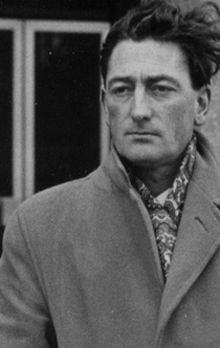Sunday Miscellany, April 2013
Married to my mother’s sister, he was Jimmie Kelly to all who knew him and Uncle Jimmie to us, but to the world outside he was James Plunkett – Plunkett being his middle name – the noted broadcaster and writer who achieved global fame as the author of Strumpet City.
However, it’s Uncle Jimmie – the name ending in a boyish “ie” – whom I want to remember here, though in truth I hardly knew him at all. That had something to do with my father, who avoided most of my mother’s attempts to socialise, which meant that family visits from our Kenilworth Park home to the Richmond Hill house occupied by Jimmie and his wife Valerie were rare occurences.
And when they moved to Rockfield Drive off the Whitehall Road and we in turn moved into Richmond Hill, my father’s continuing reluctance to encounter the world outside his front door meant that interraction between the Bolands and the Kellys remained just as fitful as before.
By then, though, I had formed a 12-year-old’s rapport with Jimmie and Valerie’s daughter, also named Valerie, but known to everyone as Petsie. I don’t know how that friendship started but it meant that every afternoon after school in St Mary’s College I would take the 15A up to Rockfield Drive and hang out with Petsie and her younger brothers.
On some of these occasions, as we played in the back garden, we could hear strains of Mozart or Schubert emanating from inside the house. These were amateur recitals in which Jimmie and Valerie, both of them keen if not flawless musicians, were joined by equally impassioned amateurs of their acquaintance, and woe betide us children if we caused any interruption to their strenuous playing.
I never really got to know Jimmie in those years and I had the sense of a man who was not much interested in the antics of chisellers like myself. But given my own newly-awakened fascination with literature I held him in some awe, though he was too much of a matter-of fact Dubliner ever to play the role of the important author. Indeed, his nightly few pints were up in The Laurels at the top of the Whitehall Road, not with other writers or with RTE types, but with Mick Dooley, an old trade union pal who worked as a clerk in the ESB and who hadn’t the slightest interest in literature.
I recall, though, little acts of personal kindness. A priest in school, Fr Maiben, had introduced me to the wonders of classical music and Jimmie furthered that interest by loaning me recordings that became central to my listening life – Bruno Walter’s lovely version of Schubert’s Great C major symphony, and the same composer’s beautiful B flat trio, with David Oistrakh on violin. Jimmie told me to be very careful with these records, not to scratch them and to be sure to get them back to him, but he gave them to me all the same and it meant a lot to me.
Another act of kindness occurred in 1969 at the launch of Strumpet City in the Bailey on Duke Street, an event that attracted huge media interest, largely because of the much-hyped advance Jimmie had got from the publisher – unprecedented in the Ireland of the time. It was there that my mother – who had a fondness for a drink but no head for it – got so scuttered on free G&Ts that Jimmie left his own reception to drive her home to Goatstown. That’s because he was a man who cared about old civilities and about my mother, too, and I’ll never forget him for that act of selfless decency on the night of his greatest triumph.
There were tragedies in his life. Petsie, his daughter and my childhood pal, died far too young, as did his beloved wife some years earlier. Indeed, when I called out to him one Christmas evening in the year before his death, I asked him how much he missed her, and he replied: Not an hour of a day goes by when I don’t think of Valerie.
That last visit to him was in 2002 in the house in Bray where he ended his days. His great friend, John Beckett, harspichordist and nephew of Sam Beckett, was also there and the three of us had a magical few hours – magical for me, anyway – talking about a variety of matters, ranging from his trade union days in a vanished Dublin to to the glories of Vaughan Williams and the wonder of John McCormack.
By then, Jimmie had become a forgotten writer. Indeed, a few months earlier when I mentioned his name to a class of literary undergraduates, none of them had heard of him. And when I went to his funeral in Bray in 2003 I was shocked to see no other writers there and, indeed, hardly anyone from RTE, to which he’d given such service.
Perhaps it was because he’d outlived most of his peers or perhaps, as I sometimes felt, it had something to do with a cultural snobbery that considered his books too straightforward and old-fashioned to be taken really seriously. Whatever the reason, it was saddening.
Now, though, he’s all over the bookshops and on the airwaves, where you can hear that lovely melodic Dublin voice of his in interviews taken from the archives. He’d have chuckled at being famous again 44 years after Strumpet City was first published. Indeed, if interviewed today, he’d no doubt have something amused and sardonic to say about the vagaries of literary fashion, the vanity of human wishes and all that old mallarkey.

